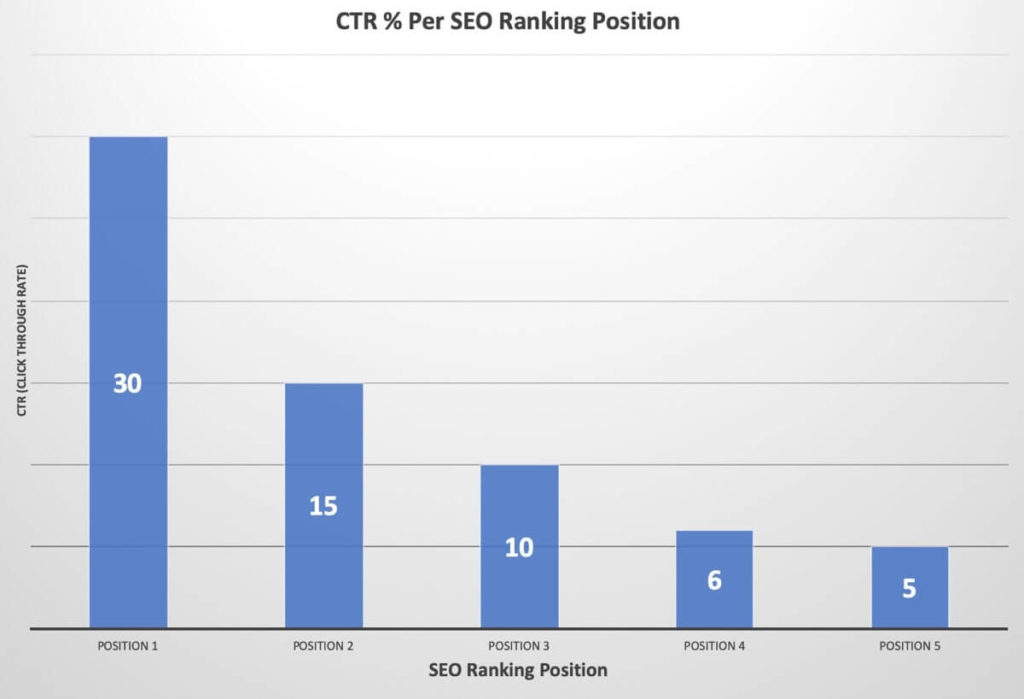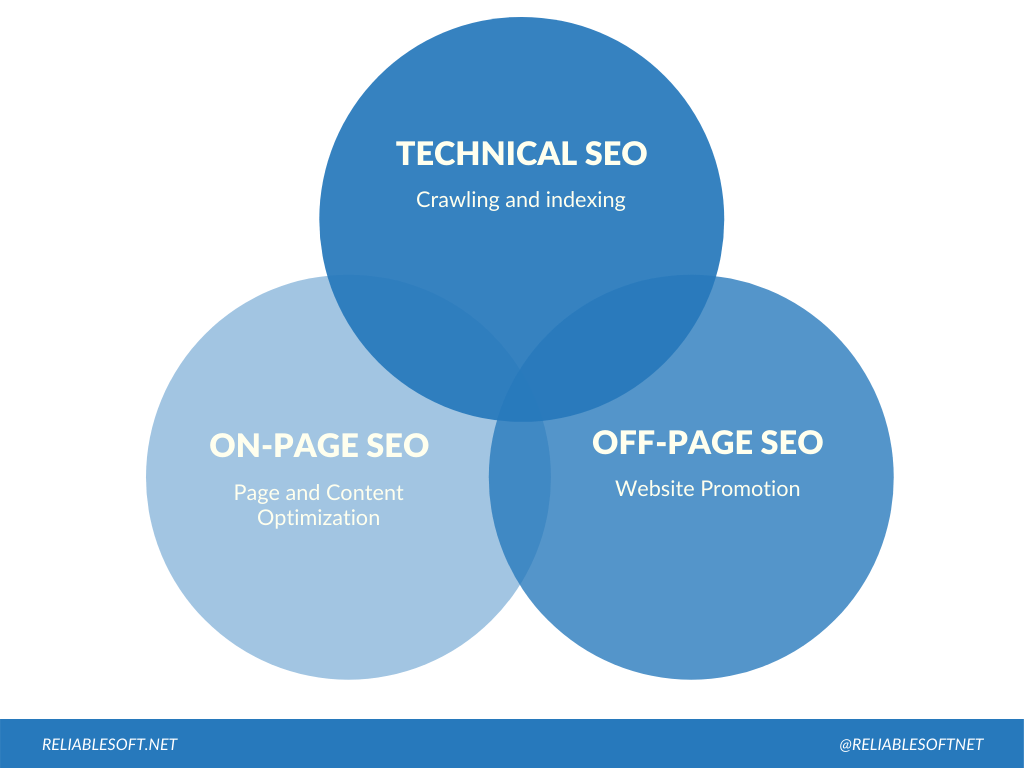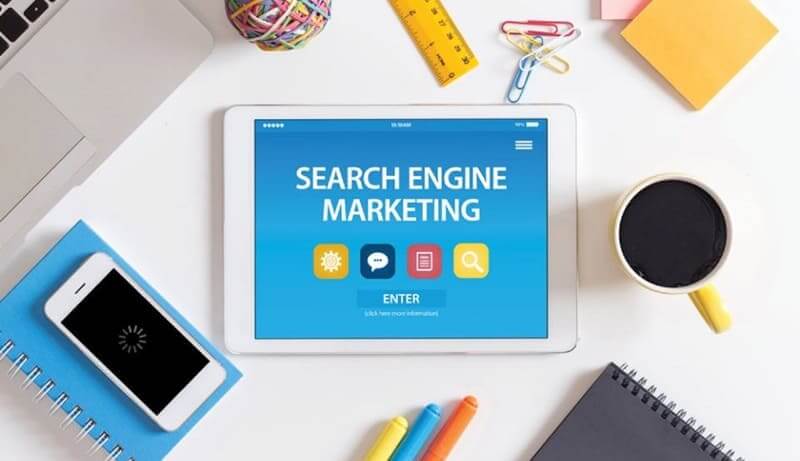Search engine marketing is a very effective digital marketing channel. Through search marketing, you can increase the visibility of your website in search engines results using paid and unpaid methods.
SEM is important because search traffic is targeted and thus more valuable than any other form of traffic you can get with other promotion methods.
In this guide, you’ll learn what is search engine marketing, why it’s important and the different types of SEM.
- What is Search Engine Marketing
- Importance of Search Marketing
- Search Marketing Types
What is Search Engine Marketing?
Table of Contents
Search Engine Marketing (also known as Search Marketing) is the process of getting traffic from search engines either organically or paid.
Search marketing has two main types: SEO (Search Engine Optimization) and PSA (Paid Search Advertising).
SEO is the way to get free traffic from search engines by achieving high rankings in the SERPs and Paid search ads are the process of paying for your ads to appear on search engine results pages.
What is the main goal of Search Marketing?
The overall goal of SEM is to increase visibility in search engines by achieving higher rankings in the SERPs (search engine results pages) or top positions for ad placements.
Higher ad positions and rankings mean more traffic and this has a number of added advantages.
As we will see later, each SEM component has a number of processes and tools.
Importance of Search Marketing
Before getting into the details on what is SEO and paid search advertising (PSA) and how to use them to get more exposure and traffic from search engines, let’s quickly examine the importance of SEM for the success of a website or online business.
It is a fact that in today’s world the Internet is the source for everything we need to know, learn, ask, buy or do.
Whenever we have a question or looking for something, the first thing we do is to turn to a search engine (in the majority of cases Google) and type in our search query.
When we hit SEARCH, we expect to either get a direct answer to our question or a list of resources (and this list includes both ads and websites), that can satisfy our intent.
Search engines are working hard to improve the quality of their search results by presenting to the searcher those websites (or ads) that will keep their users happy and come back again for more searches.
To do that they have developed complex algorithms that take a number of variables into account before they decide which websites (or ads) to show in the top positions.
Search engine marketing is important because it’s the process to follow to optimize your website or ads so that they appear in the top positions.
Your goal is not just to have a presence in search engines but to show up in one of the top 5 positions for the search terms (keywords), that matter for your business or website.
Statistics show that the majority of users click on one of the top ads or one of the first five organic results.

Search Marketing Types
There are a number of techniques you can follow to improve your presence in search engines (organically) and to achieve higher positions for your ads.
As mentioned above, these are grouped into two main types, SEO and PSA.
Search Engine Optimization (SEO)
Search engine optimization or SEO is the process of optimizing your website for achieving higher rankings in search engines for certain keywords.
SEO principles can also help you create high-quality websites with good content and satisfy the user intent.
Until 10 years ago, SEO was about keyword stuffing, publishing mediocre content and building links but this is not the case today.
SEO has become more complex and to get it right, you have to take into account a number of parameters.
To make the whole process easier, it is broken down into the following SEO types:

SEO – optimize your website for the crawling and indexing process so that search engines can discover, read and understand your website.
On-Page SEO – optimize all pages of your website one-by-one and give search engines the right signals to understand what your website and individual pages is all about.
Off-Page SEO – promote your website on the internet, get good quality backlinks and prove to search engine algorithms that your website deserves to be in one of the top spots for the keywords you want.
You may also come across other terms which describe specific aspects of SEO like:
- Content SEO – give both users and search engines the content they want and keep them happy
- Local SEO – optimizes your website so that people can find and visit your brick and mortar store
- eCommerce SEO – SEO rules that are applicable to eCommerce websites only.
- Mobile SEO – make it easy for users to find and use your website while on the go and from their mobile or tablet devices.
Why is SEO important?
Higher rankings, more traffic: If your goal with search marketing is to get traffic to your website without having to pay for ads, then SEO is the way to go.
As mentioned above, the websites that appear in the top 3 positions of the organic results get more than 60% of the traffic – This statistic alone explains the importance of SEO.
Search engine traffic is targeted: Open Google and search for anything you want. The websites that appear in the top positions get thousands of visits from Google on a daily basis.
Depending on the keywords you used, they are probably making thousands of dollars in revenue (from advertising or selling their own products or services), because search engine traffic is highly targeted.
Unlike traffic coming from Facebook or other social media networks, organic traffic converts better since the users have a clear intent in mind before typing something into Google and it’s not just for curiosity or leisure.
Besides the traffic, SEO offers a number of other advantages and these can be summarized into the following:
Trust and recognition: Users trust search engines because they know that they have strict rules as to which websites are shown in the search results, and in turn, they trust websites that rank in the top positions.
Trust does not only generate more conversions but it also increases recognition and brand awareness and this makes your digital marketing efforts in other channels easier.
SEO can guide you on how to create better websites: SEO is not just about search engines but it’s mainly about users. To have a fully optimized website for search engines, it has to optimized for users first and this is what SEO is all about.
Paid Search Advertising (PSA)
Besides getting organic traffic from Search engines, the other way to take advantage of the millions of users that use search engines on a daily basis and get targeted traffic to your website is through paid ads.
If you search Google you will notice that above and below the organic results, you are presented with Paid Ads.
This is what we mean by paid search advertising. Instead of trying to achieve high rankings through SEO, you can pay your way to the top.
Of course, as we will see below, that’s not so easy. It gets more complicated when a number of advertisers are competing for one of the top ad positions.
The most commonly used model is the PPC (Pay Per Click), which means that you pay only when someone clicks on your ad and the most widely used PSA system is Google Ads.
Google Ads is owned by Google and it is the platform you need to use to show your ads on Google, Youtube or the thousands of websites that participate in the Google ad network.
How does PPC Work?
The way it works is simple but it gets more complicated when you are dealing with niches and keywords that have a lot of competition. Here is an overview of the process:
- You create a Free account with Google Ads
- You set up advertising campaigns. Each campaign can contain a number of ad groups, keywords, and ads.
- You specify your target audience i.e. which people can see your ads (you can narrow down your selection by country, time of day, user location, etc).
- You start the campaign and you only pay when someone clicks on your ad.
- You monitor the results of your campaigns and make the necessary changes.
How much you pay every time someone clicks on your ad depends on a number of factors.
The system will give you in advance an indication of how much you will be charged per click but the actual amount is decided when it actually happens.
Google Ads in an auction-based system. This means that the cost of each click and the position your ad will appear depends on ‘demand and supply’.
Every time a search is made on Google, Google Ads runs an auction for the available ad positions.
Advertisers that are willing to pay more, have higher quality ads that are most likely to satisfy the user intent, they win the top positions.
Example:
To make this easier to understand, let’s say that there are 20 advertisers who sell ‘engagement rings’ and want to have their ads shown in the first page of Google when people search for ‘Buy an Engagement Rings’.
Google shows 3-4 ads above the organic search results and 2-3 ads at the bottom. This means that there are only 7 ad spots on the first page but there are 20 advertisers.
Which ads will show on these 7 available positions?
This is where pay per click marketing comes into play. Similar to SEO, the Google Ads system takes into account a number of rules before deciding where each ad is to be shown.
Some of the factors can be controlled by advertisers such as the price they are willing to pay per click, the quality of the ads etc, some are decided during the auction and some are only known to Google.
What you need to understand is that while Paid advertising is a great way to promote your website on Google, it’s not always as simple as setting up an account and run a campaign.
There is an optimization process in place and if you don’t want to lose your money without any return, it is best to leave this task to professional marketers.
When to use PPC Ads?
When you want fast results – One of the disadvantages of SEO is that takes time to work.
The competition is intense in all niches and it takes time to achieve high rankings for the keywords you want.
So, while working on your SEO and waiting patiently to get higher rankings and organic traffic, you can start a campaign in Adwords and get the traffic this way.
You will pay for the traffic but as long as the ROI is positive, then you have more to gain than lose.
You sell expensive products or services – PPC ads are not for every business. The costs of setting up a campaign and the costs per click are high and unless you sell products at a price that can make you profit, PPC is not the solution for you.
Your SEO is already working and you want better results – PPC and SEO can work together in harmony. It’s never the one or the other.
If you already have some good results with SEO, you can increase your market share by running ads for the same keywords that generate organic traffic for your business.
You run an online business – when you run an online business without having a physical presence and your only source of customers is the Internet, then you need to make paid search advertising work for you.
SEO is a fantastic way to get customers but if your business depends on it, then it’s better to have PPC ads as a second way out.
Difference between SEO and SEM
As explained above, SEO is one of the major components of SEM (search engine marketing). The other one is PSA (Paid search advertising).
A lot of people tend confusing SEO and SEM and sometimes when they refer to SEM they actually mean PSA i.e. the paid advertising part and they consider SEO to be a process that it’s outside the boundaries of Search Marketing.
KEY LEARNINGS
No business or website can survive online unless it follows solid search engine marketing practices.
Search engine marketing gives you the framework, tools, and processes to gain more visibility in search engines either by getting higher positions in organic results or better positions for your ads.
The two main types of SEM, SEO, and PPC can work together in harmony and maximize your results.
In the online business world, it’s never one or the other. Both are two powerful tools in your digital marketing arsenal, which you can use to boost your online presence.
If you are new to search marketing then what you need to have clear in your mind is that there are no shortcuts. In order to succeed with either SEO or PPC, you need to put the user experience on top of anything else.
Your first task is to make sure you have a great website that is functional and easy to use, then to work on your content and deliver the best possible result to your users.
Once you have this in place, your next step is to start working on your SEO and gradually work your way to the top of the organic results and if applicable, to start working on your PPC campaigns and maximize your Return on Investment (ROI).
Running successful SEM campaigns is not easy, it requires special skills, a lot of experience and hard work.
If you don’t possess those skills then it’s best to leave it to professionals. Save your precious time and time and at the same time increase your chances of getting the results you want in the fastest possible way.
